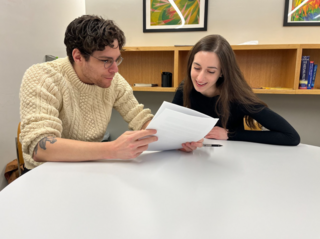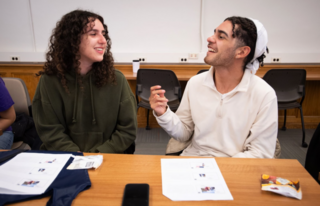| Registration |
Registration is required for GSAS graduate students who want the certificate to appear on their transcript. Complete the GSAS Certificate Program Declaration Request – and note that we do not require you to submit a statement of interest. |
No registration is required. |
| Foundational Courses |
- Poorvu Center Fundamentals of Teaching (4 sessions)
- Occasionally, the Poorvu Center offers seminars that may be substituted for the Fundamentals on a case-by-case basis, such as the “Scientific Teaching Fellows Course [BBS 879/PHYS 530]” and “Equitable Teaching in the Social Sciences and Humanities (in-person, 8 sessions)
- To determine the eligibility of substituted seminars, contact askpoorvucenter@yale.edu
|
- Center for the Integration of Research, Teaching, and Learning (CIRTL) open online course (self-paced, asynchronous, 12 weeks): “An Introduction to Evidence-Based Undergraduate STEM Teaching” (12 weeks), OR
- CIRTL online course (synchronous, 12 weeks): “The College Classroom” (12 weeks), OR
- Occasionally, the Poorvu Center offers seminars that may be substituted for the above courses on a case-by-case basis, such as the “Scientific Teaching Fellows Course [BBS 879/PHYS 530]” and “Equitable Teaching in the Social Sciences and Humanities (in-person, 8 sessions)
|
| Intermediate and Advanced Teaching Workshops |
8 ITWs and ATWs
- One workshop must be ITW: Classroom Observation
- Two workshops must be advanced
- Select workshops according to your interests and your level of experience
- Two-part workshops count as two sessions (e.g. ATW on Course Design)
- On a case-by-case basis, workshops offered through the Center for the Integration of Research, Teaching, and Learning may be substituted. No more than 50% of your ITW/ATW requirements may be fulfilled by CIRTL workshops, i.e., no more than 4 total workshops and no more than 1 ATW.
|
6 ITWs and ATWs
- One workshop must be ITW: Classroom Observation
- Two workshops must be advanced
- Select workshops according to your interests and your level of experience
- Two-part workshops count as two sessions (e.g. ATW on Course Design)
- On a case-by-case basis, workshops offered through the Center for the Integration of Research, Teaching, and Learning may be substituted. No more than 50% of your ITW/ATW requirements may be fulfilled by CIRTL workshops, i.e., no more than 3 total workshops and no more than 1 ATW.
|
| Teaching |
2 semesters of teaching at Yale |
Not required |
| Observations |
All observation reports should be compiled in submitted at the end of the CCTP, and you and your observers may use this form (observation report). During the session, you and your observers may use the pre-class questionnaire and in-class observation protocol), but they are not required.
You are required to undergo:
- 2 occasions of observing someone else’s teaching with written reflections of those observations
- Participants arrange their own observations
- Participants can select someone to observe whose work aligns with their future teaching goals. This might include but is not limited to leading review sessions, teaching section, leading a large lecture course, teaching in outreach or collections settings, teaching workshops (formally or informally), teaching as part of programs like Splash, Yale Young Global Scholars, or Pathways to Science/Arts and Humanities
- 2 occasions of being observed while teaching with written reflections by the observer
- Observations by a McDougal Fellow are available upon request (askpoorvucenter@yale.edu)
- Alternatively, a faculty member/colleague can observe (participants should arrange these on their own)
|
All observation reports should be compiled as part of the portfolio submitted at the end of the CCTP, and you may use this form (observation report). During the session, you may use these forms (pre-class questionnaire and during class observation protocol), but they are not required.
You are required to undergo:
- 2 occasions of observing someone else’s teaching with written reflections of those observations
- Participants arrange their own observations
- Postdoctoral and DNP participants are not required to be observed while teaching, though they are welcome to take advantage of the opportunity
|
| Learning Communities |
2 Learning Communities (LCs)
- The Poorvu Center hosts 2 communities each semester, with topics determined anew each time.
- Alternatively, Participants are encouraged to form their own, meeting the following requirements:
- Topics must focus primarily on teaching or mentorship (e.g., job market materials, topics of interest, teaching within the discipline
- Groups of at least 3 people
- Must meet at least 4 times in a semester
|
2 Learning Communities (LCs)
- The Poorvu Center hosts 2 communities each semester, with topics determined anew each time.
- Alternatively, Participants are encouraged to form their own, meeting the following requirements:
- Topics must focus primarily on teaching or mentorship (e.g., job market materials, topics of interest, teaching within the discipline
- Groups of at least 3 people
- Must meet at least 4 times in a semester
|
| Teaching Portfolio and Exit Interview |
Participants must complete:
- A teaching portfolio (requirements outlined below)
- A 50-minute exit interview, discussing:
- your future career plans, your experiences at Yale and in the CCTP program, feedback on the element of your choice in the portfolio
Email askpoorvucenter@yale.edu to arrange your exit interview. Please allow between two weeks and a month for processing your portfolio and scheduling.
In order for the certificate to appear on the transcript, graduating students should plan to complete the certificate before graduation, before the date that final grades are due for degree recipients. Please consult the academic calendar for details.
|
Participants must complete:
- A teaching portfolio (requirements outlined below)
- A 50-minute exit interview, discussing:
- your future career plans, your experiences at Yale and in the CCTP program, feedback on the element of your choice in the portfolio
Email askpoorvucenter@yale.edu to arrange your exit interview. Please allow between two weeks and a month for processing your portfolio and scheduling.
|

